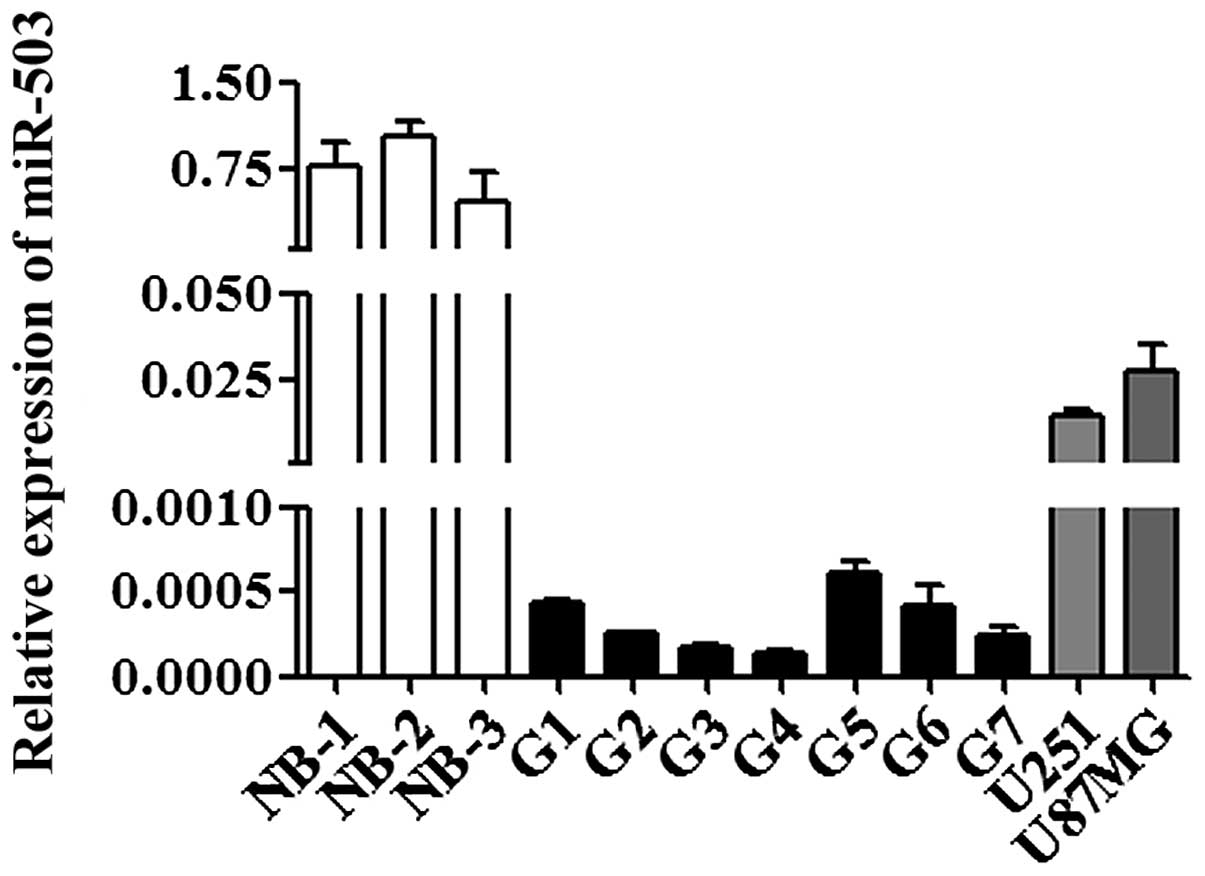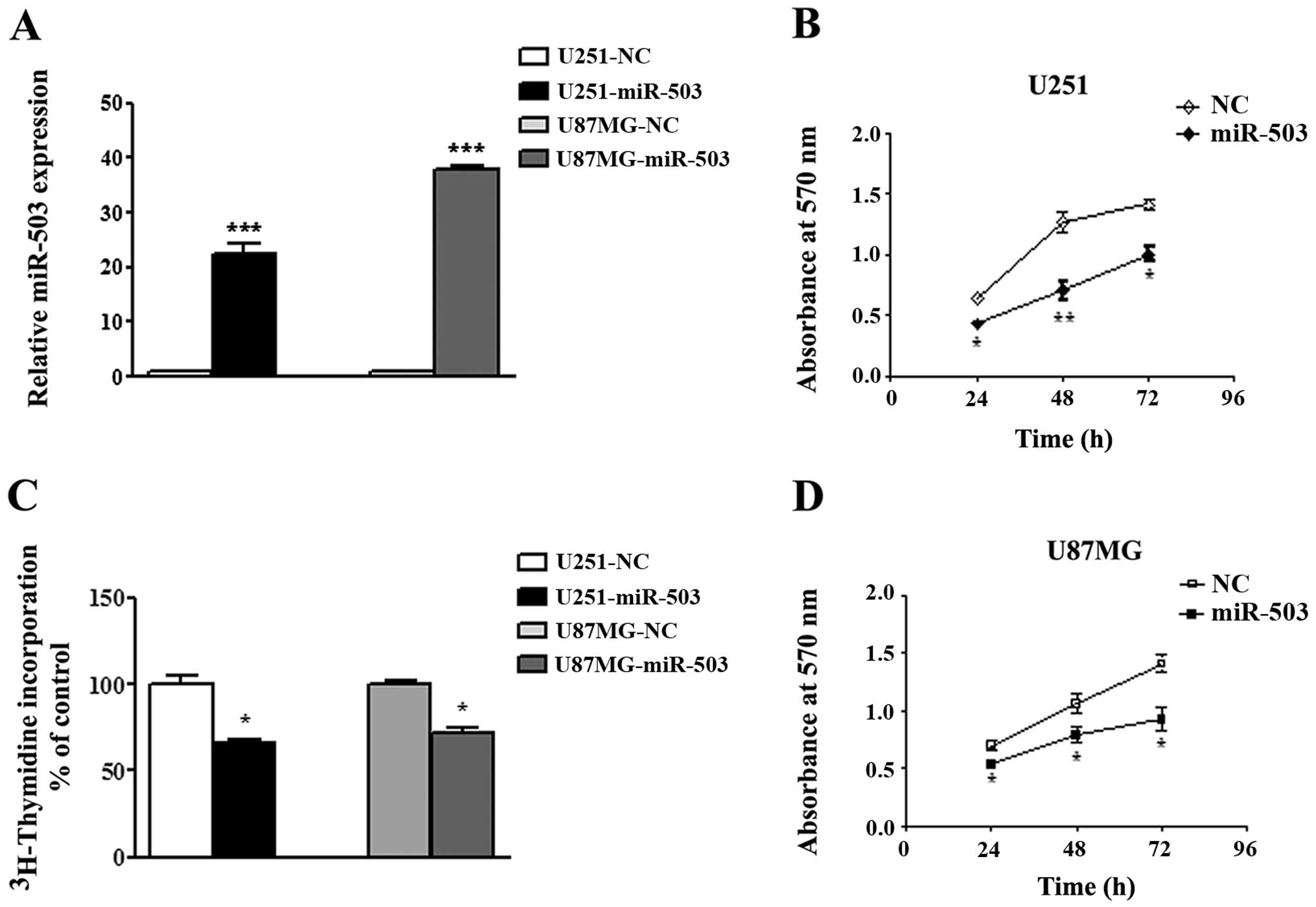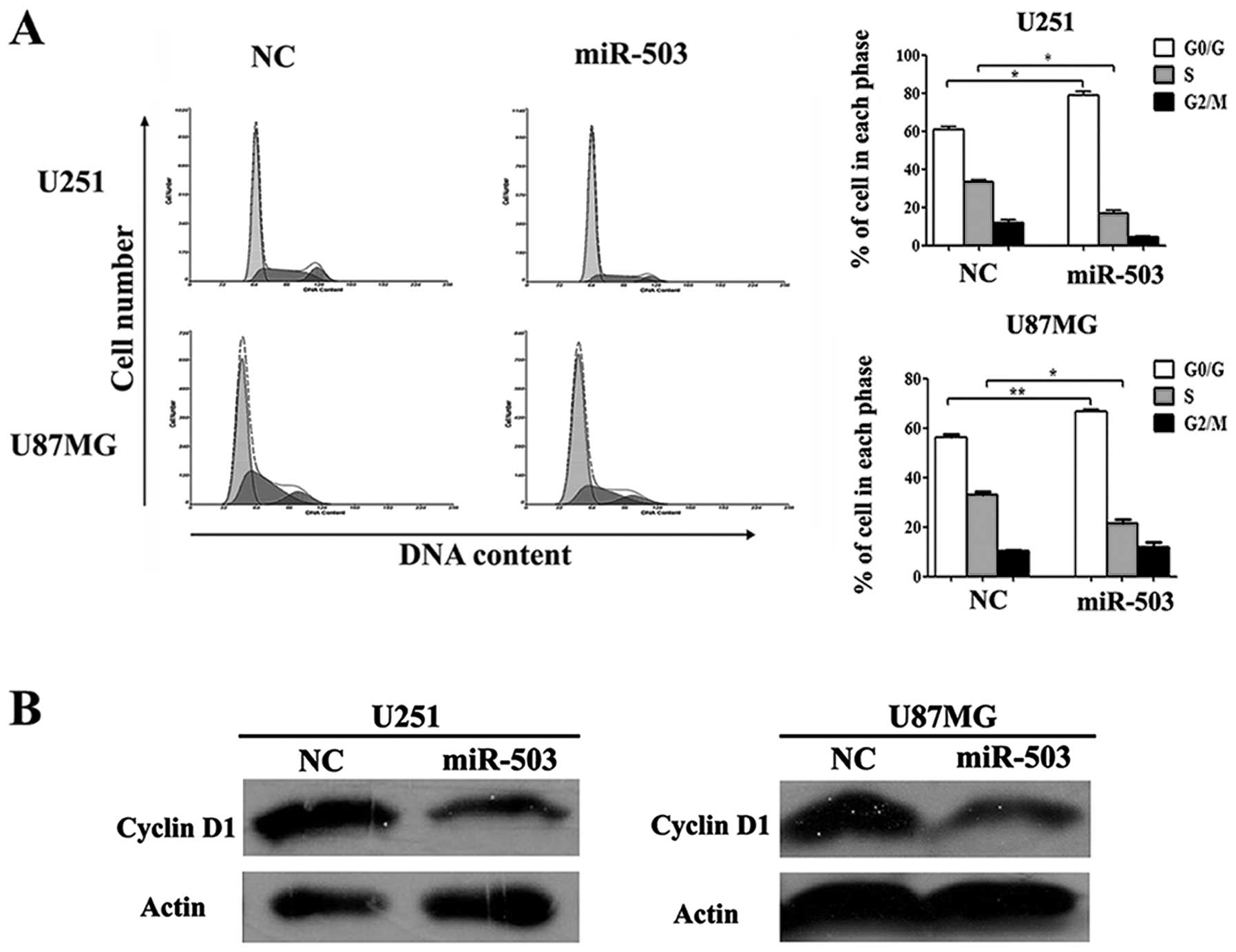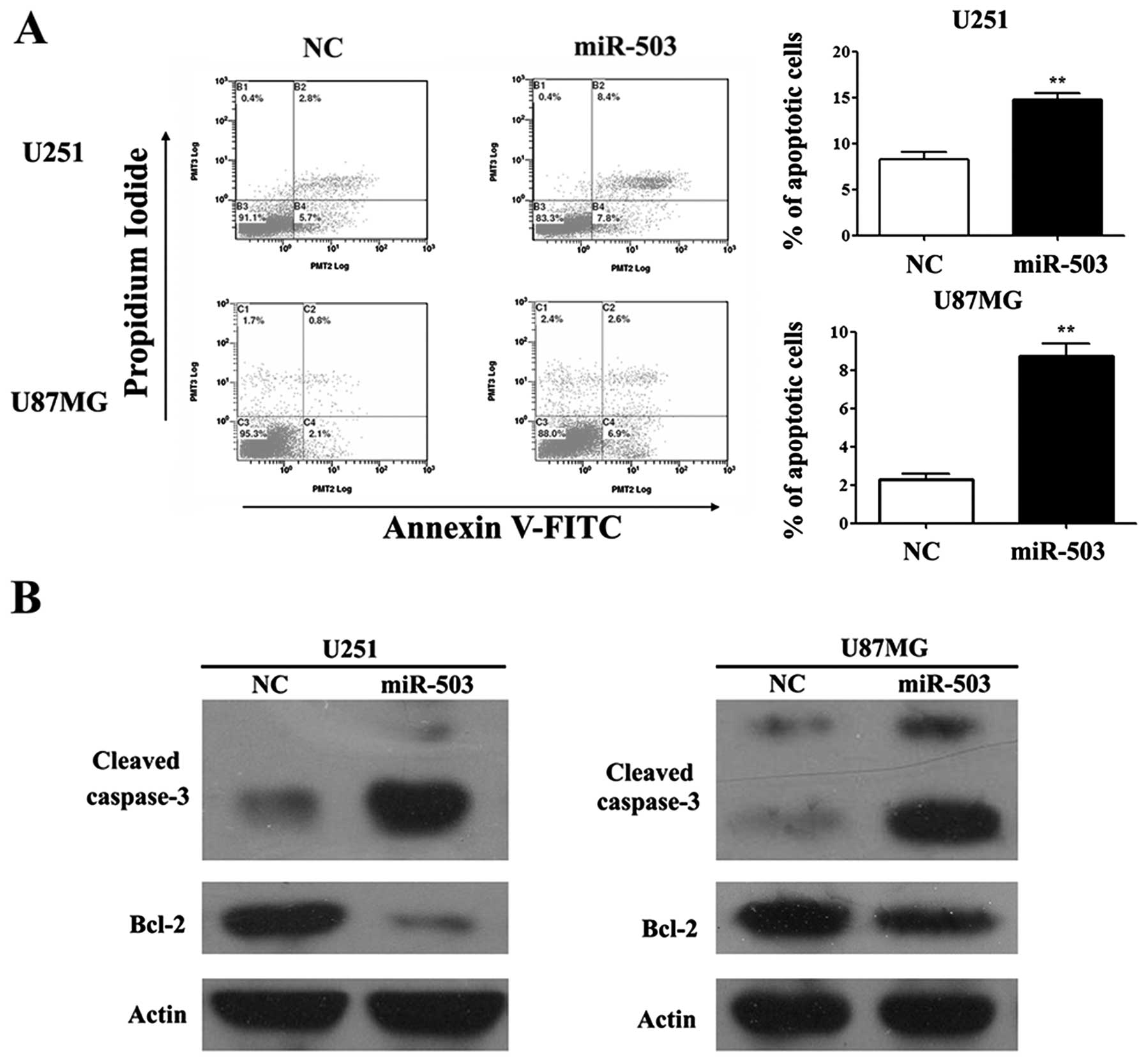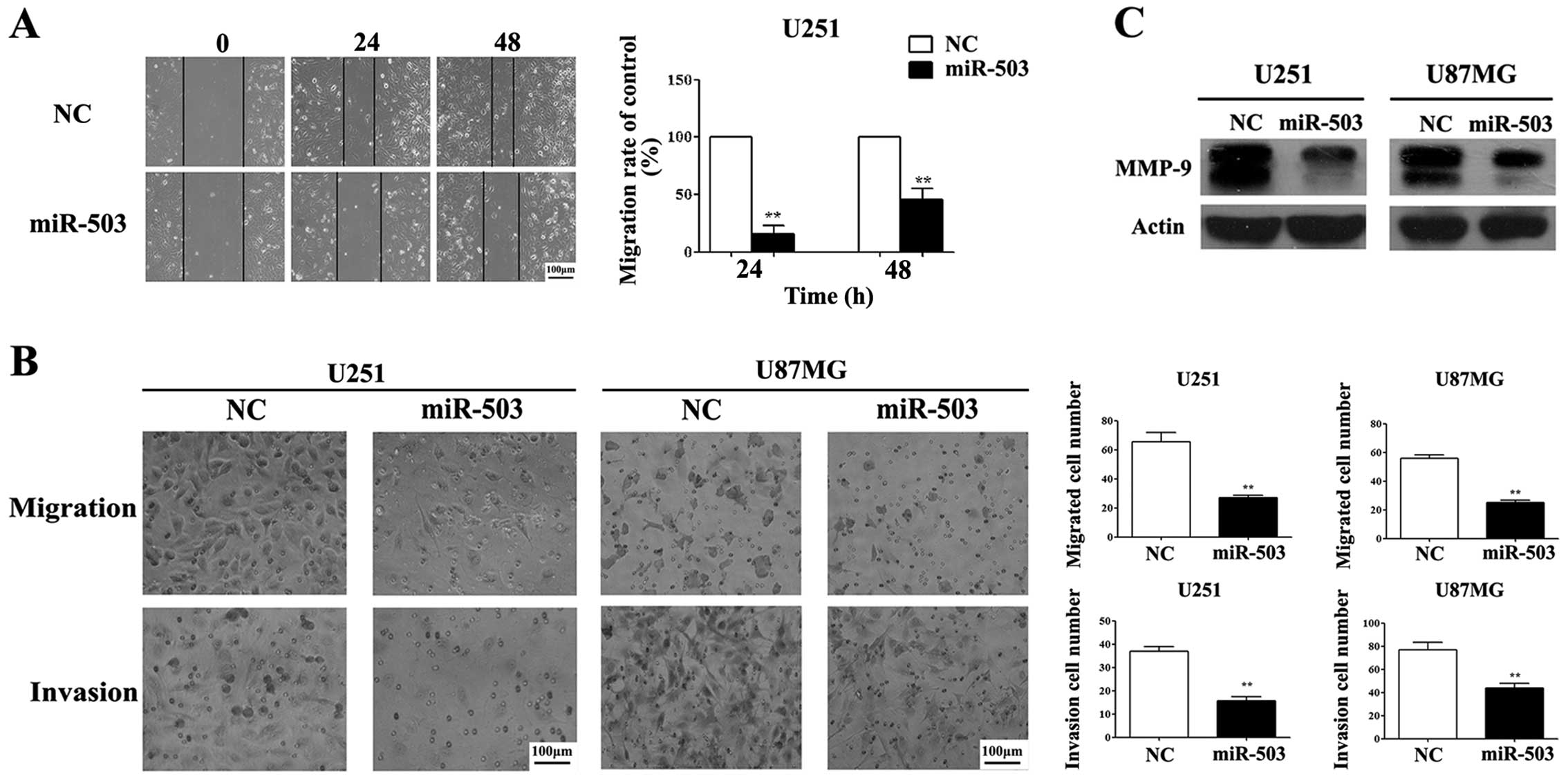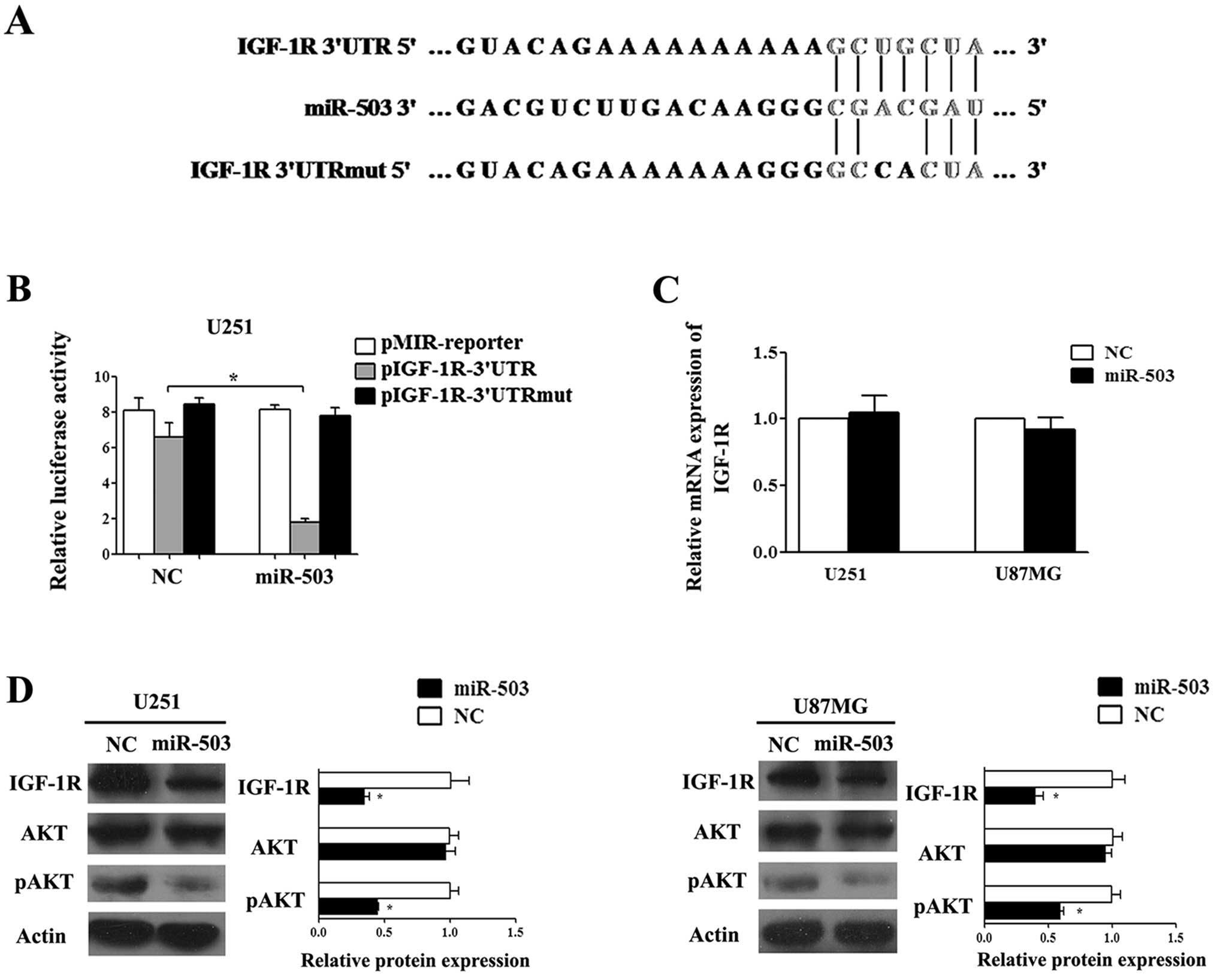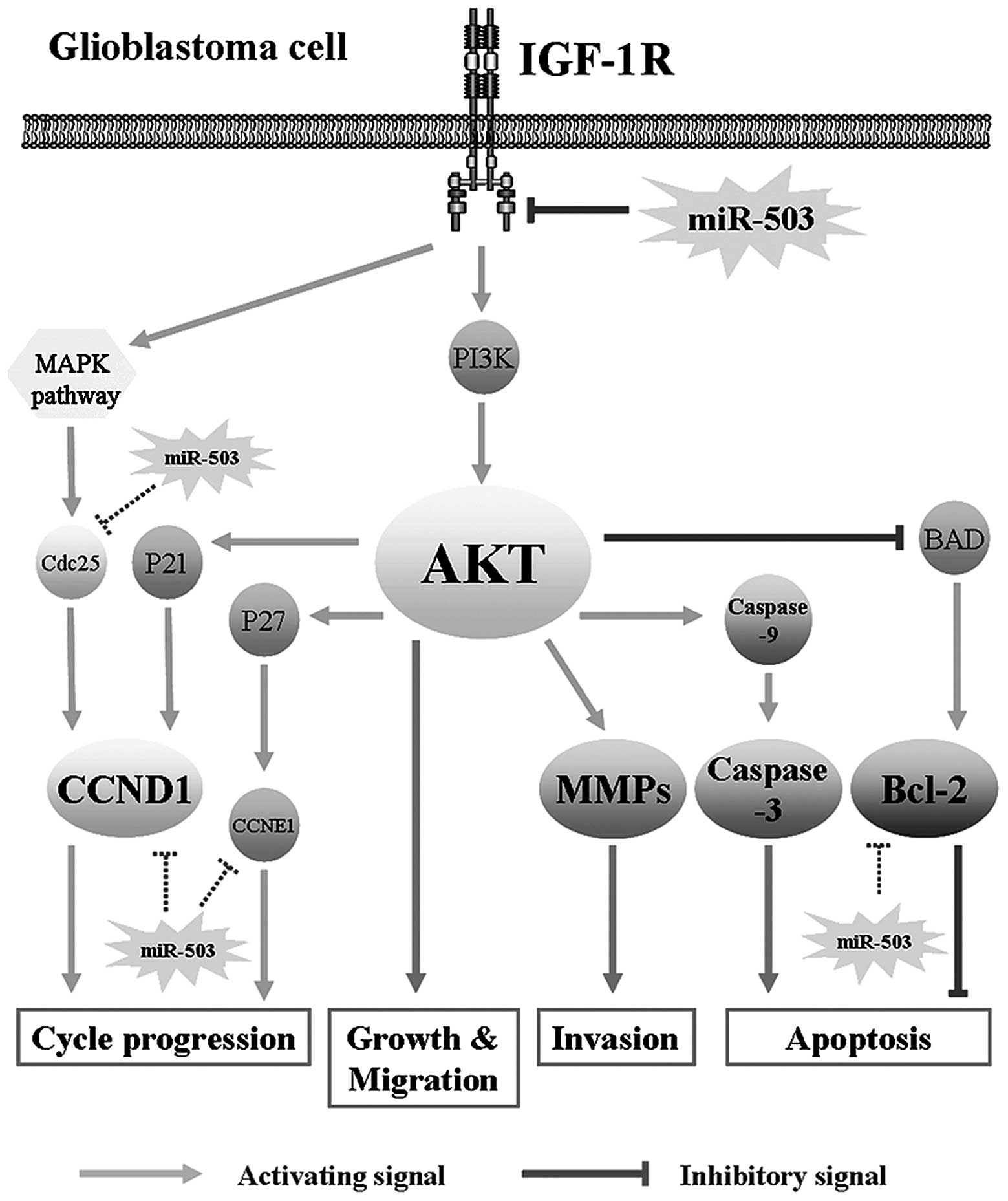|
1
|
von Deimling A, Louis DN and Wiestler OD:
Molecular pathways in the formation of gliomas. Glia. 15:328–338.
1995.PubMed/NCBI
|
|
2
|
Louis DN, Ohgaki H, Wiestler OD, et al:
The 2007 WHO classification of tumours of the central nervous
system. Acta Neuropathol. 114:97–109. 2007. View Article : Google Scholar : PubMed/NCBI
|
|
3
|
Lu J, Getz G, Miska EA, et al: MicroRNA
expression profiles classify human cancers. Nature. 435:834–838.
2005. View Article : Google Scholar : PubMed/NCBI
|
|
4
|
Bousquet M, Zhuang G, Meng C, et al:
miR-150 blocks MLL-AF9-associated leukemia through oncogene
repression. Mol Cancer Res. 11:912–922. 2013. View Article : Google Scholar : PubMed/NCBI
|
|
5
|
Chan JA, Krichevsky AM and Kosik KS:
MicroRNA-21 is an antiapoptotic factor in human glioblastoma cells.
Cancer Res. 65:6029–6033. 2005. View Article : Google Scholar : PubMed/NCBI
|
|
6
|
Ciafrè SA, Galardi S, Mangiola A, et al:
Extensive modulation of a set of microRNAs in primary glioblastoma.
Biochem Biophys Res Commun. 334:1351–1358. 2005.PubMed/NCBI
|
|
7
|
Zhang QQ, Xu H, Huang MB, et al:
MicroRNA-195 plays a tumor-suppressor role in human glioblastoma
cells by targeting signaling pathways involved in cellular
proliferation and invasion. Neuro Oncol. 14:278–287. 2012.
View Article : Google Scholar : PubMed/NCBI
|
|
8
|
Li X, Ling N, Bai Y, et al: MiR-16-1 plays
a role in reducing migration and invasion of glioma cells. Anat
Rec. 296:427–432. 2013. View
Article : Google Scholar : PubMed/NCBI
|
|
9
|
Lakomy R, Sana J, Hankeova S, et al:
MiR-195, miR-196b, miR-181c, miR-21 expression levels and
O-6-methylguanine-DNA methyltransferase methylation status
are associated with clinical outcome in glioblastoma patients.
Cancer Sci. 102:2186–2190. 2011. View Article : Google Scholar : PubMed/NCBI
|
|
10
|
Caporali A and Emanueli C: MicroRNA-503
and the extended microRNA-16 family in angiogenesis. Trends
Cardiovasc Med. 21:162–166. 2011. View Article : Google Scholar : PubMed/NCBI
|
|
11
|
Zhao JJ, Yang J, Lin J, et al:
Identification of miRNAs associated with tumorigenesis of
retinoblastoma by miRNA microarray analysis. Childs Nerv Syst.
25:13–20. 2009. View Article : Google Scholar : PubMed/NCBI
|
|
12
|
Fisher JF and Mobashery S: Mechanism-based
profiling of MMPs. Methods Mol Biol. 622:471–487. 2010. View Article : Google Scholar : PubMed/NCBI
|
|
13
|
Hägerstrand D, Lindh MB, Peña C, et al:
PI3K/PTEN/Akt pathway status affects the sensitivity of high-grade
glioma cell cultures to the insulin-like growth factor-1 receptor
inhibitor NVP-AEW541. Neuro Oncol. 12:967–975. 2010.PubMed/NCBI
|
|
14
|
Corbetta S, Vaira V, Guarnieri V, et al:
Differential expression of microRNAs in human parathyroid
carcinomas compared with normal parathyroid tissue. Endocr Relat
Cancer. 17:135–146. 2010. View Article : Google Scholar : PubMed/NCBI
|
|
15
|
Tömböl Z, Szabó PM, Molnár V, et al:
Integrative molecular bioinformatics study of human adrenocortical
tumors: microRNA, tissue-specific target prediction, and pathway
analysis. Endocr Relat Cancer. 16:895–906. 2009.
|
|
16
|
Özata DM, Caramuta S, Velázquez-Fernández
D, et al: The role of microRNA deregulation in the pathogenesis of
adrenocortical carcinoma. Endocr Relat Cancer. 18:643–655.
2011.PubMed/NCBI
|
|
17
|
Zhou B, Ma R, Si W, et al: MicroRNA-503
targets FGF2 and VEGFA and inhibits tumor angiogenesis and growth.
Cancer Lett. 333:159–169. 2013. View Article : Google Scholar : PubMed/NCBI
|
|
18
|
Xiao F, Zhang W, Chen L, et al:
MicroRNA-503 inhibits the G1/S transition by downregulating cyclin
D3 and E2F3 in hepatocellular carcinoma. J Transl Med. 11:1952013.
View Article : Google Scholar : PubMed/NCBI
|
|
19
|
Xu YY, Wu HJ, Ma HD, et al: MicroRNA-503
suppresses proliferation and cell-cycle progression of endometrioid
endometrial cancer by negatively regulating cyclin D1. FEBS J.
280:3768–3779. 2013. View Article : Google Scholar : PubMed/NCBI
|
|
20
|
Qiu T, Zhou L, Wang T, et al: miR-503
regulates the resistance of non-small cell lung cancer cells to
cisplatin by targeting Bcl-2. Int J Mol Med. 32:593–598.
2013.PubMed/NCBI
|
|
21
|
Finnerty JR, Wang WX, Hébert SS, et al:
The miR-15/107 group of microRNA genes: evolutionary biology,
cellular functions, and roles in human diseases. J Mol Biol.
402:491–509. 2010. View Article : Google Scholar : PubMed/NCBI
|
|
22
|
Babak T, Zhang W, Morris Q, et al: Probing
microRNAs with microarrays: tissue specificity and functional
inference. RNA. 10:1813–1819. 2004. View Article : Google Scholar : PubMed/NCBI
|
|
23
|
Baskerville S and Bartel DP: Microarray
profiling of microRNAs reveals frequent coexpression with
neighboring miRNAs and host genes. RNA. 11:241–247. 2005.
View Article : Google Scholar : PubMed/NCBI
|
|
24
|
Peltier HJ and Latham GJ: Normalization of
microRNA expression levels in quantitative RT-PCR assays:
identification of suitable reference RNA targets in normal and
cancerous human solid tissues. RNA. 14:844–852. 2008. View Article : Google Scholar : PubMed/NCBI
|
|
25
|
Furuta M, Kozaki K, Tanimoto K, et al: The
tumor-suppressive miR-497-195 cluster targets
multiple cell-cycle regulators in hepatocellular carcinoma. PLoS
One. 8:e601552013.PubMed/NCBI
|
|
26
|
Caporali A, Meloni M, Völlenkle C, et al:
Deregulation of microRNA-503 contributes to diabetes
mellitus-induced impairment of endothelial function and reparative
angiogenesis after limb ischemia. Circulation. 123:282–291. 2011.
View Article : Google Scholar : PubMed/NCBI
|
|
27
|
Sarkar S, Dey BK and Dutta A: MiR-322/424
and -503 are induced during muscle differentiation and promote cell
cycle quiescence and differentiation by down-regulation of Cdc25A.
Mol Biol Cell. 21:2138–2149. 2010. View Article : Google Scholar : PubMed/NCBI
|
|
28
|
Jiang Q, Feng MG and Mo YY: Systematic
validation of predicted microRNAs for cyclin D1. BMC Cancer.
9:1942009. View Article : Google Scholar : PubMed/NCBI
|
|
29
|
Jiang R, Mircean C, Shmulevich I, et al:
Pathway alterations during glioma progression revealed by reverse
phase protein lysate arrays. Proteomics. 6:2964–2971. 2006.
View Article : Google Scholar : PubMed/NCBI
|
|
30
|
Carapancea M, Alexandru O, Fetea AS, et
al: Growth factor receptors signaling in glioblastoma cells:
therapeutic implications. J Neurooncol. 92:137–147. 2009.
View Article : Google Scholar : PubMed/NCBI
|
|
31
|
Friend KE, Khandwala HM, Flyvbjerg A, et
al: Growth hormone and insulin-like growth factor-I: effects on the
growth of glioma cell lines. Growth Horm IGF Res. 11:84–91. 2001.
View Article : Google Scholar : PubMed/NCBI
|
|
32
|
Resnicoff M, Abraham D, Yutanawiboonchai
W, et al: The insulin-like growth factor I receptor protects tumor
cells from apoptosis in vivo. Cancer Res. 55:2463–2469.
1995.PubMed/NCBI
|
|
33
|
Bellacosa A, Kumar CC, Di Cristofano A and
Testa JR: Activation of AKT kinases in cancer: implications for
therapeutic targeting. Adv Cancer Res. 94:29–86. 2005. View Article : Google Scholar : PubMed/NCBI
|
|
34
|
Nakada M, Niska JA, Tran NL, et al:
EphB2/R-Ras signaling regulates glioma cell adhesion, growth, and
invasion. Am J Pathol. 167:565–576. 2005. View Article : Google Scholar : PubMed/NCBI
|
|
35
|
Jones RA, Campbell CI, Petrik JJ and
Moorehead RA: Characterization of a novel primary mammary tumor
cell line reveals that cyclin D1 is regulated by the type I
insulin-like growth factor receptor. Mol Cancer Res. 6:819–828.
2008. View Article : Google Scholar : PubMed/NCBI
|
|
36
|
Wilsbacher JL, Zhang Q, Tucker LA, et al:
Insulin-like growth factor-1 receptor and ErbB kinase inhibitor
combinations block proliferation and induce apoptosis through
cyclin D1 reduction and Bax activation. J Biol Chem.
283:23721–23730. 2008. View Article : Google Scholar
|
|
37
|
Schlenska-Lange A, Knüpfer H, Lange TJ, et
al: Cell proliferation and migration in glioblastoma multiforme
cell lines are influenced by insulin-like growth factor I in vitro.
Anticancer Res. 28:1055–1060. 2008.PubMed/NCBI
|
|
38
|
Oh SH, Kang JH, Kyu Woo J, et al: A
multiplicity of anti-invasive effects of farnesyl transferase
inhibitor SCH66336 in human head and neck cancer. Int J Cancer.
131:537–547. 2012. View Article : Google Scholar : PubMed/NCBI
|
|
39
|
Saikali Z, Setya H, Singh G and Persad S:
Role of IGF-1/IGF-1R in regulation of invasion in DU145 prostate
cancer cells. Cancer Cell Int. 8:102008. View Article : Google Scholar : PubMed/NCBI
|
|
40
|
Kang DW and Min do S: Platelet derived
growth factor increases phospholipase D1 but not phospholipase D2
expression via NFκB signaling pathway and enhances invasion of
breast cancer cells. Cancer Lett. 294:125–133. 2010.PubMed/NCBI
|
|
41
|
Feng X, Aleem E, Lin Y, et al: Multiple
antitumor effects of picropodophyllin in colon carcinoma cell
lines: Clinical implications. Int J Oncol. 40:1251–1258.
2012.PubMed/NCBI
|
|
42
|
Min S, Liang X, Zhang M, et al: Multiple
tumor-associated microRNAs modulate the survival and longevity of
dendritic cells by targeting YWHAZ and Bcl2 signaling pathways. J
Immunol. 190:2437–2446. 2013. View Article : Google Scholar : PubMed/NCBI
|















